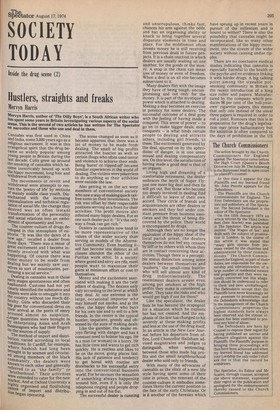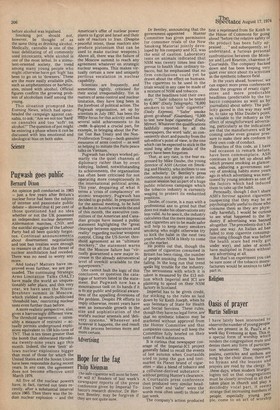SOCIETY TODAY
Inside the drug scene (2)
Hustlers, straights and freaks
Mervyn Harris
Mervyn Harris, author of 'The Dilly Boys', is a South African writer who has spent some years in Britain investigating various aspects of the social scene. This is the second of two articles he has written for The Spectator on narcotics and those who use and deal in them.
Cannabis was first used in China and India, some 3,000 years ago as a religious sacrament. It was in this evangelical spirit that the drug became so widely popular among Young people in Britain during the last decade. Cults grew up around the smoking of cannabis which became inextricably bound up with the hippy movement, long hair and withdrawal from society.
The movements ot revolt and Withdrawal were attempts to restore the 'poetry of life' by sections of mainly middle class youth. Dis enchanted with the increaing rationalisation and technical regu
lation of social life, the change they desired was an often instant transformation of the personality and social relations into an embo,diment of spontaneity and love.
The counter-culture of drugs developed in this atmosphere of eu Phoria. "It was like the dawn of a new age," recalled a dealer from those days. "There was a sense of great excitement and I became in tensely involved with what was haPpening. Of course there was some money to be made from dealing but we mainly saw ourselves as sort of missionaries, performing a social service." Dealing in cannabis was in those early stages spontaneous and often
haphazard. Customs had not yet
clearly identified the substance and hiPpies were able to smuggle it into the country without too much dif ficulty. Girls who discarded their hip gear for conventional dress on their arrival at the ports of entry
aroused almost no suspicion. arger quantities were brought in ',0Y enterprising Asian and Arab
"sinesstnen who had their fingers on the sources of supply. The method of import and distribution varied according to local
conditions. In Cardiff, for example, Where hashish had long been brought in by seamen and circulat
ed among members of the black
community, the dealers were known to each other and generally referred to as "the family" or "brotherhood." Their activities Were extended to cater for the new iLnarket. And at Oxford University a 12IghlY organised and flourishing %,:entre of import and distribution began operating.
The scene changed as soon as it became apparent that there was a lot of money to be made from dealing. The smell of big profits attracted the hustler as well as certain thugs who often used terror and violence to achieve their ends. Being 'burnt' or 'ripped off' became familiar experiences in the world of dealing. The victims were powerless to do anything as their activities were outside the law.
Also getting in on the act were members of conventional society who saw a way of making quick taxfree sums on their investments. The risk was offset by their respectable positions serving as a front for their activities. The profit motive also infected many hippy dealers. For as one such dealer put it: "It's the only way a freak can get rich."
Dealers in cannabis now tend to be more representative of the values of the wider society than serving as models of the Alternative Community. Even hustling itself has become less distinct as all classes abandon the ethos of the Puritan work ethic. In a society where greed and envy are rife, most people want to maximise their gains at minimum effort or cost to themselves.
Money and the excitement associated with making it are the twin pillars of dealing. The dealers only vary according to the level at which they deal. At one extreme is the large, occasional importer who may himself not smoke, and at the other, the hippy dealer who buys for his own use and to sell to a few friends. In the centre is the typical hustler, impatient, greedy and obsessed by the aura of making deals.
Like the gambler, the dealer enjoys flirting with danger and has a constant need to bolster his ego. He is a man (or woman) in a hurry. He has little time and wants to get rich quickly. He is restless and likes to be on the move, going places fast.
His lack of patience and tendency to get bored with routine are drawbacks to his successful entry into the conventional business world. For he savours the sensation of something always happening around him, even if it is only the telephone ringing and people dropping in and out of his flat.
The successful dealer is cunning and unscrupulous, thinks fast. chances his arm against the odds, and has an organising ability or knack to bring together several disparate elements in time and place. For the middleman often invests money he is still receiving from previous deals in future projects. It is a chain reaction in which dealers are usually waiting on one another, for the goods or the money. A snap in the chain can mean loss of money or even of freedom. When a deal is on all else becomes subservient to it.
Many dealers flirt with the image they have of being tough, uncompromising and out only for the money. It is part of the mystique of power which is attached to dealing. Making a deal becomes an exercise in potency for some dealers. The successful outcome of a deal goes with the feeling of having made a conquest. This sense of power — to go on to make bigger deals, more conquests — is what binds certain people to dealing and attracts others, including girl friends, to them. The excitement generated by the deal, spurred on by the aphrodisiac of danger, is in one sense sexual and dealing compensatory sex. On this level, the satisfaction of having made a good deal is that of an orgasm.
Living high and dreaming of a comfortable retirement, the dealer embraces the myth of Super Fly: just one more big deal and then he will get out. But those who become too deeply involved in dealing find it difficult to leave of their, own accord. Their circle of friends and acquaintances are other dealers or smokers and they feel under constant pressure from business associates and the threat of being discovered by the police. Their world is encompassed by drugs.
Although they are no longer the equivalent of the hippy ideal of the local parish priest, the dealers themselves do not feel any censure by self or by others with whom they are in contact concerning their activities. Though there is a perceptible status distinction among some dealers between themselves and 'pushers,' the small-time hustler who will sell almost any kind of drug indiscriminately. The resentment dealers arouse even among pot smokers at the high profits they make is considered as unfair. They take the risks and who would get high if not for them?
Like the speculator, the dealer feels he has become the scapegoat for a situation which he exploits but has not created. And the emphasis of the law has changed to hit severely at those making profits and less at the use of the drug itself.
In an article in the New Law Journal before his departure from office, Lord Chancellor Hailsham advised magistrates and judges to distinguish, when sentencing, between those who made big profits and the small neighbourhood dealer who sold only to friends.
With many of the advocates of cannabis as the elixir of a new life style having spent some of their time in prison, the remnant of the counter-culture it embodies some times likens the current position to the fate of the early Christians. Or is it another of the heresies which have sprung up in recent years in pursuit of the millenium and is bound to wither? There is also the possibility that cannabis might be incorporated, like so many other manifestations of the hippy movement, into the stream of the wider society without causing undue ripples.
There are no conclusive medical studies indicating that cannabis is especially harmful to the health or the psyche and no evidence linking it with harder drugs. A big talking point among the sizeable potsmoking community in Britain is the recent introduction of a king size roller and papers. Manufactured by the company which produces 96 per cent of the 'roll-yourown' cigarette papers, this means that only one instead of the usual three papers is required in order to roll a joint. Rumours that this is in preparation for the drug's legalisation may prove hallucinatory but the situation is often compared to the days of prohibition in the US before alcohol was legalised.
Smoking pot should not, however, be thought of as the same thing as drinking alcohol. Medically, cannabis is one of the least debilitating of all commonly used intoxicants, while alcohol is one of the most lethal. In a stimulant-oriented society, the trend among many young people who might otherwise have got 'high' has been to go on to 'downers. These are the more easily available pills, such as amphetamines or barbiturates, mixed with alcohol. Official figures confirm the growing problem of alcoholism itself among the young.
This situation prompted the Evening News, which had spearheaded the campaign against cannabis, to ask: "Are we not too 'hard' on cannabis and too 'soft' on alcohol?" The question of pot might be entering a phase where it can be discussed with less emotional and ideological bias on both sides.



































 Previous page
Previous page